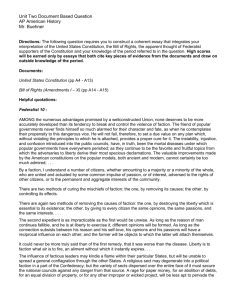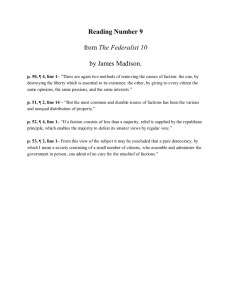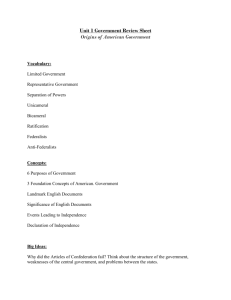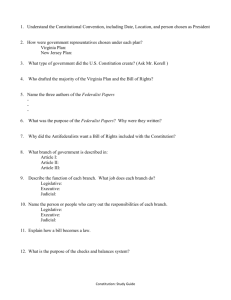REVOLUTION AND CONSTITUTION REVIEW Causes of the
advertisement
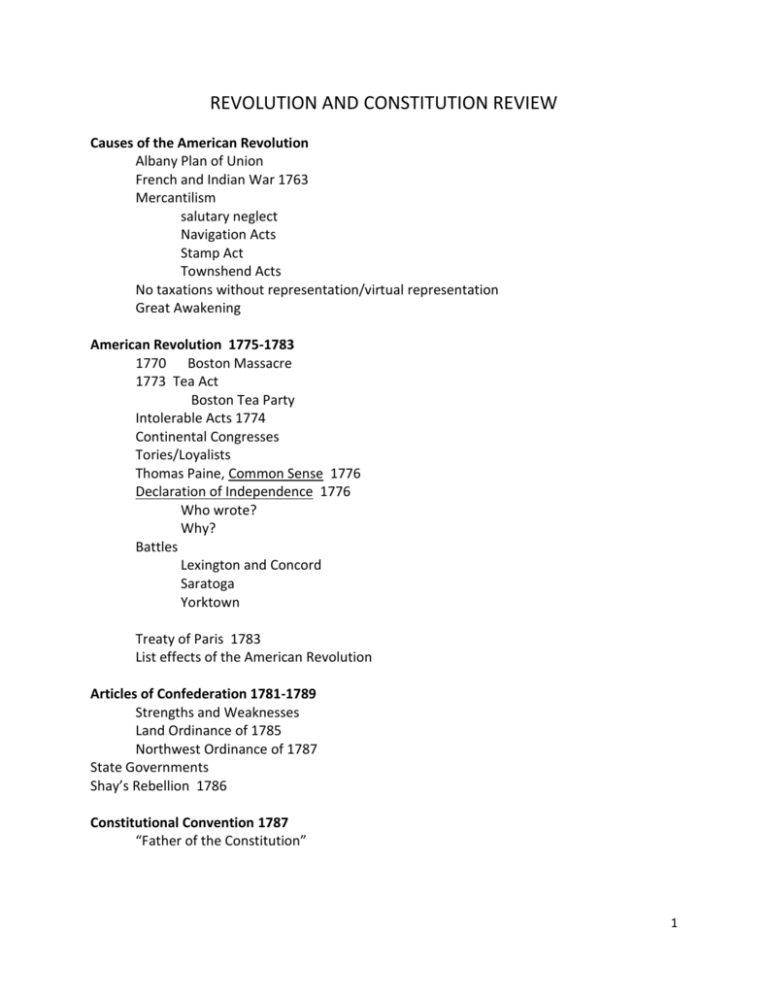
REVOLUTION AND CONSTITUTION REVIEW Causes of the American Revolution Albany Plan of Union French and Indian War 1763 Mercantilism salutary neglect Navigation Acts Stamp Act Townshend Acts No taxations without representation/virtual representation Great Awakening American Revolution 1775-1783 1770 Boston Massacre 1773 Tea Act Boston Tea Party Intolerable Acts 1774 Continental Congresses Tories/Loyalists Thomas Paine, Common Sense 1776 Declaration of Independence 1776 Who wrote? Why? Battles Lexington and Concord Saratoga Yorktown Treaty of Paris 1783 List effects of the American Revolution Articles of Confederation 1781-1789 Strengths and Weaknesses Land Ordinance of 1785 Northwest Ordinance of 1787 State Governments Shay’s Rebellion 1786 Constitutional Convention 1787 “Father of the Constitution” 1 Compromises of the Constitution Great Compromise (Connecticut Plan) 3/5 Compromise Commerce Compromise Presidency Compromise Ratification Anti-Federalists Federalists Federalist Papers Bill of Rights American Government According to the Preamble of the Constitution, who is creating it? Name an example of each type of power under federalism: delegated implied denied concurrent reserved How is the term of a Supreme Court Justice different from other federal officeholders? Identify: Veto Unwritten constitution Filibuster Cloture 2 Census Impeachment Electoral College Why does the Constitution require a census every ten years? What impact does the census have on the Electoral College? What can’t the president do? Define judicial review. Marbury v. Madison 1803 How is the process of amending the Constitution an example of federalism? 12. What rights were considered the most important in the Bill of Rights? (as seen by how much attention is given.) Define “due process of law” . 3 FEDERALIST PAPER #10 ABRIDGED The Union as a Safeguard Against Domestic Faction and Insurrection From the New York Packet. Friday, November 23, 1787. [written by James Madison] AMONG the numerous advantages promised by a well constructed Union, none deserves to be more accurately developed than its tendency to break and control the violence of faction…... By a faction, I understand a number of citizens, …., who are united and actuated by some common impulse of passion, or of interest, adverse to the rights of other citizens, or to the permanent and aggregate interests of the community. . . . . The latent causes of faction are thus sown in the nature of man. . . . It is in vain to say that enlightened statesmen will be able to adjust these clashing interests, and render them all subservient to the public good. Enlightened statesmen will not always be at the helm. . . . The inference to which we are brought is, that the CAUSES of faction cannot be removed, and that relief is only to be sought in the means of controlling its EFFECTS. ….. From this view of the subject it may be concluded that a pure democracy, by which I mean a society consisting of a small number of citizens, who assemble and administer the government in person, can admit of no cure for the mischiefs of faction. A common passion or interest will, in almost every case, be felt by a majority of the whole; a communication and concert result from the form of government itself; and there is nothing to check the inducements to sacrifice the weaker party or an obnoxious individual. Hence it is that such democracies have ever been spectacles of turbulence and contention; have ever been found incompatible with personal security or the rights of property; and have in general been as short in their lives as they have been violent in their deaths. ….. A republic, by which I mean a government in which the scheme of representation takes place, opens a different prospect, and promises the cure for which we are seeking. …The two great points of difference between a democracy and a republic are: first, the delegation of the government, in the latter, to a small number of citizens elected by the rest; secondly, the greater number of citizens, and greater sphere of country, over which the latter may be extended. ……In the extent and proper structure of the Union, therefore, we behold a republican remedy for the diseases most incident to … government. PUBLIUS. 4
